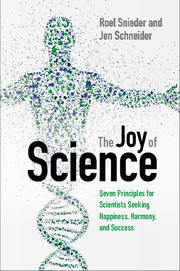1 - Harmony
Published online by Cambridge University Press: 05 June 2016
Summary
You will never find your perfect life “balance” on the path [of life] for the same reason you will never find a unicorn on the path – because these things don't exist. Forget unicorns and balance. If you were perfectly balanced, you'd never have to take anyone's hand to steady yourself, and that would be a tragedy.
–Glennon Melton Doyle (2014)THE LURE OF “BALANCE”
Many professionals, including scientists, find themselves wanting to “balance” professional and personal life. The pressure to excel, or be the best, can easily degenerate into a feeling that one can never work enough. The work atmosphere at different universities and other research organizations varies greatly, but there is frequently pressure to spend exceedingly long hours in the office and continue working at home. There is nothing wrong with working hard, but we also find that the temptation to work excessive hours – at the expense of other parts of our lives – is particularly strong for academics, for whom there are often no set work hours, and “deliverables” are never-ending. In the long run, however, such a lifestyle may come at the expense of our relationships, our peace of mind, and our health. Let's not fool ourselves: both life experience and research suggest that overwork actually results in diminishing returns in terms of work productivity as well (Robinson S., 2012).
The “balance” between professional and personal life is particularly difficult for early-career scientists trying to prove themselves on the tenure track (Mason, Wolfginger, & Goulden, 2013). Just when learning curves and pressures are at their highest, these highly educated people may also be considering starting families, creating a perfect storm of demands and expectations. These years may be especially difficult for female scientists who often have the physical experience of bearing and nursing children and, depending on their circumstances and relationships, may also find themselves responsible for a larger share of childcare and household duties. Scholars are careful to point out that our current academic system in the United States supports neither new mothers nor new fathers particularly well (Mason, Wolfginger, & Goulden, 2013) and there is the perception, if not the reality, that being on the “mommy track” is harmful to one's career.
- Type
- Chapter
- Information
- The Joy of ScienceSeven Principles for Scientists Seeking Happiness, Harmony, and Success, pp. 18 - 34Publisher: Cambridge University PressPrint publication year: 2016

